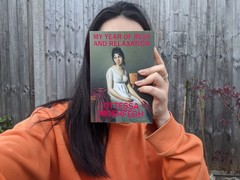We're discussing a new chapter each week. Read along with us and submit your thoughts to coronabookclub@vice.com.
“I felt I was on my way to a great transformation,” the narrator says as she prepares for her of sleep. What do you think she is hoping will happen?
Nana Baah: She’s desperate for any sort of change in her life, but there isn’t necessarily one specific change that she’s hoping for. It could be to wake up and be a completely different person, or for the world around her to look completely different.Charlotte Spencer (via email): I think she’s hoping her attachments will disappear without her having to do the work of ridding herself of them. If she came back as a new form then not only would her present and past relationships, memories and obligations disappear but she wouldn’t have any new ones. She could hope to reappear as a different kind of person, who would actually go out and do life and be happy about it, but I think at this point she might prefer to be, like, a tree or a bird.Lauren O’Neill: Sleep in this novel is seen as both an escape from the everyday pressures of life within capitalism – which is everywhere and leaks onto everything – and a sort of cleansing ritual of the narrator’s imagining. In this chapter, she refers to what she wants to do as “hibernation” a few times. Animals hibernate for the winter – the toughest part of the year to survive – and they wake up renewed, when the weather is warmer and the outlook for their species is better. It’s interesting that the narrator thinks it’s her that will change – rather than the world becoming more hospitable to her – once she wakes up. Is it a product of her self-centredness? Or a comment on a productivity culture that infects everything we do, to the extent that rest – something ordinary that we should expect to be able to take part in – feels rebellious and healing? Maybe it’s both! The beauty of literature!Leri Riglar (via email): I think that although she doesn’t admit it explicitly, the protagonist is looking for healing from the passing of her parents and her dysfunctional childhood. When she wakes and refers to not looking any different, there’s a sense of disappointment which suggests that ultimately the protagonist no longer wishes to be defined by the same things she thinks currently define her for other people – her wealth and privilege, her good looks, her status as an orphan.Hannah Ewens: The narrator’s sadness really came out over the course of this chapter. Her insecurities and vulnerabilities that were only hinted at in chapter one are obvious scars in Technicolor now. If she keeps taking these drugs and sleeping through the days and nights that are clearly causing her psychological and emotional pain, there will be oblivion. Not death but a psychic death. And after that, there must be something. We all go to bed early if we’ve had a bad day and hope that we will wake up tomorrow a new person. The narrator – cynical and cruel as she is – has had a series of bad days, months, years, so it’ll take a long time to fix.We’re yet to mention Dr. Tuttle, the narrator’s unhinged therapist. What do you make of her?
LO: I love Dr. Tuttle because she’s so fun to read (there’s a line about her in the first chapter – “The first time I met Dr. Tuttle, she wore a foam neck brace because of a ‘taxi accident’ and was holding an obese tabby, whom she introduced as ‘my eldest’.” – which is so funny I hardly know where to start.) She’s obviously a total quack, and also gives Moshfegh an opportunity to point to just how fucked up the American pharmacy and insurance systems are. She basically gives the narrator whatever pills she asks for, and has no qualms about keeping her highly medicated – she seems to believe in the pills, and it can't hurt that the narrator is paying for her prescriptions. Bernie for President!NB: Obviously, doling out prescription drugs and forgetting everything your patient has told you isn’t great practice. But between our protagonist, Reva and what we know about Trevor so far, Dr. Tuttle might just be the best character we’ve got.HE: I don’t have a completely textured feel for her yet but she seems to represent two archetypes: the wild woman and the psychologist who is "mad" herself. She’s also an embodiment of America’s pill-happy pharmaceutical industry-slash-mode of psychological treatment. Obviously, the way in which Tuttle provides the narrator with any and all medications she wants is both laughable and disturbing, which is how we should see the way in which medications were handed out in the US in 2000 (and still are.) Where there was a celebrity who died of a tragic prescription drug overdose, there was no doubt a Tuttle a phone call away.So, I’m interested to find out whether we learn more about Tuttle beyond her character’s humour. Will her life’s experiences or off-kilter ramblings teach the narrator anything about how to exist in the world (as opposed to just prescribing the narrator into the void)? I hope so.In this chapter, we learn more about the narrator’s relationship with her parents. How has this affected her?
HE: I had the narrator’s mother pegged from the start: she was always going to be a cold, perfectionistic bitch. The narrator has been chronically unloved, and meticulously scrutinised since birth; the only moments where she did feel joy or warmth from her mother stick out to her, and soon become sour. There were so few good moments. It’s made her a version of her own mother.Both of my parents are living, so I can only imagine what it’s like to be an adult orphan: to lose your parents who loved you and were close to you would be heartbreaking and change your life forever. But to lose parents you had a difficult relationship with, ties that you never understood or came to terms with? That would be awful – to never know peace or be comforted by happy memories. Every day would be an existence in wallowing through symbols, like the narrator does in dreams: her parents dead bodies in a ravine, static in place of their voices on the other end of the phone.Leri: The insight into the protagonist’s childhood goes a long way to explain her current position and mindset. The sneering and dismissive way she thinks of and sometimes speaks to Reva is very reminiscent of how her mother behaved with her. Both parents avoid and dismiss any kind of acknowledgement of emotions. The way they couch a "birds and bees" talk in terms of oxytocin and follow this up with the cancer diagnosis really illustrates this. It sounds like a very lonely un-nurturing childhood which explains the detached and cold way the protagonist has of thinking, as well as her tendency to see drugs as being a reasonable way to manage emotions.Charlotte: Her parents appear in her dreams a lot and she seems to remember actual conversations with them which suggests their outlook on her life is pretty firmly instilled in her mind. We have evidence from their chats that they’ve got some pretty kooky ideas. They approach her pre-college sex talk from the angle of brain chemicals and attachment, and dive straight into unwanted pregnancy via the objective truth that she’s going to get “thrown out.” Chemistry and pessimism: kind of the narrator’s specialities.LO: It’s no surprise that the character’s mother was cold and emotionally detached, because it’s common for us to mirror our parents’ behaviour. What I find most interesting is the revelation in the previous chapter that the one thing the narrator and her mother enjoyed doing together was sleeping – the fact that it’s basically the only thing linked with maternal energy for her might provide the key to why sleep feels like it might be so rejuvenating.We also learn that following the death of her parents, the narrator feels untethered from the world (this is a feeling which ultimately manifests in her desire to sleep). Reflecting on Trevor once telling her to sell their house (but to wait until the market improves, of course), she thinks: “I wanted to hold on to the house the way you’d hold on to a love letter. It was proof that I had not always been completely alone in this world.” It’s a reminder that, despite the withdrawn nature of her narration, she’s still human.What do you think the narrator likes about Trevor?
NB: I feel bad for her because Trevor quite clearly has no redeeming qualities to speak of. So it makes sense that the narrator turns their relationship over in her head so often – she finds it difficult to believe that she was, and maybe still is, in love with someone like him.Leri: From an outsider’s viewpoint, there doesn’t seem to be much to like about Trevor. It’s a bit of a cliche but it seems kind of like a classic "daddy issues" hook-up. Trevor is older and enjoys giving the impression of being worldly and knowledgeable but the protagonist herself calls him "a loser and a moron" which suggests that the relationship represents an act of self-sabotage on her part. Given what we now know about the protagonist’s early life it’s difficult to see how she would have been able to cope with a more obviously loving or affectionate relationship. The disinterest that Trevor shows in her when they are having dinner is what she’s used to from her parents. I suspect as well that contrasted with the awe and envy of people at school, the protagonist finds Trevor’s attitude of being so much less impressed with her quite refreshing.HE: For someone as hot as our narrator, it almost surprises me that she’s still so hung up on Trevor, someone she clearly doesn’t fully respect. God, Trevor is a useless prick. But Trevor came along around the same time that she lost her parents. She is completely devastated and scarred from the loss, which she’s refusing to deal with, so of course she would fall into this painful on-off relationship with someone who doesn’t feel. In their relationship, there’s no room for her to care or be vulnerable.“She was always getting her hair blown out, her eyebrows waxed into thin arched parentheses, her fingernails painted various shades of pink and purple, as though all of this made her a wonderful person,” is one of the thoughts that the narrator has about Reva. What is Moshfegh saying about women and beauty here?
HE: This specific sentence has such a strange tone to it, in contrast to the rest of the book so far. I read it as though the narrator’s mask had slipped a little. Sure, Reva may be vain, annoying and all the rest but what’s wrong with getting your nails done and your eyebrows waxed? These are very normal activities for a young woman and not indicative at all of character. I’m sure Reva doesn’t think having painted nails makes her “wonderful”. This feels as though the narrator is battling her own ideas about beauty and perhaps materialism. Did she, rather than Reva, once feel that way?It reminds me of the part in the first chapter where the narrator was ordering fashion and beauty items online while asleep or half-asleep. Is the narrator highly materialistic (well, she is rich) and fighting that in some abstract way? Although she’s traditionally beautiful, does she want to strip that back too, to really get to some truth and healing underneath?Charlotte: She also uses alienating language, calling Reva’s eyebrows “parentheses” which pushes Reva’s features into the realm of a parenthetical, her face a side thought, and suggesting that beauty treatment in any case is unnatural. She describes the treatments rather than naming them, and we’re sure she knows what a blow-out or a manicure is, but she’s making it exceptionally clear to the reader that she is distant from these things, exempted even. She might be distancing herself from female gender stereotypes, or just being defensive of her choices not to wash and shave.LO: All her life, the narrator has met conventional beauty standards. Describing herself – and her flock of “Reva-like” admirers – at school, she notes, “I was blond and thin and pretty – that’s what people noticed. That’s what those girls cared about.” Frequently throughout the book so far, emphasis is placed on the fact that she is beautiful without trying. Reva’s attempt at conventional beauty, by contrast, is framed as "effortful" – she is bulimic, is constantly working out, and she also undergoes all of the procedures in the above quote that the narrator finds so distasteful.The narrator acknowledges that these are procedures that she too used to subscribe to, but it seems that as her connections to the real world – employment, living family, a relationship – have dissolved. Ironically, the only thing she is motivated to be "effortful" in is her pursuit of sleep, which she seems to see as the pursuit of a sort of higher consciousness.PROMPTS FOR WEEK THREE
a) One of the most entertaining revelations in this chapter is that the narrator does lots of stuff in her sleep. What do her actions – ordering clothes and food, sending nudes to people she meets on chat rooms – tell us?
b) “Sleep was the hydraulic piston that lifted the bed of the truck up, ready to dump everything out somewhere, but Trevor was stuck in the tailgate, blocking the flow of garbage,” the narrator muses. What do we learn about her relationship with Trevor in this chapter?
c) “In the distance, people were living lives, having fun, learning, making money, fighting and walking around and falling in and out of love.” In this chapter, we feel more keenly than before that the narrator really does want human connection. How does this colour our view of her from the last two chapters?
d) At the end of the chapter, the narrator is seemingly on the train to Long Island, at Reva’s request. What does it tell us that she’s done as Reva asked?
Send your responses to coronabookclub@vice.com by 12PM on Tuesday the 14th of April and check next week's discussion post for the Week Four prompts!@hiyalauren / @hannahrosewens / @nanasbaah


